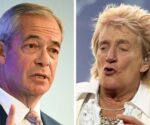Hassett: Inflation Is Lowest It’s Been In 4 Years. If The Fed Were Data Driven, They Would Be Lowering Interest Rates
Director of the National Economic Council Kevin Hassett told “Special Report” host Bret Baier he has “high confidence” President Donald Trump will be able to overcome the “bumpy ride” and sign the “Big, Beautiful Bill” before the July deadline.
BRET BAIER, HOST: So let’s discuss the prospects for the president’s bill and take a look at what else is going on with the economy after the tenure of current Fed Chairman Jerome Powell. The president says is he ready to make another choice. Joining us tonight, National Economic Council Director Kevin Hassett. Kevin, let me start with the bill. You heard Chad’s reporting. It seems like a bumpy right here this weekend in the Senate and then maybe in the House. KEVIN HASSETT, DIRECTOR, NATIONAL ECONOMIC COUNCIL: I think this kind of bill is always a bumpy ride at the end. What happens is you have got elected leaders of the Senate who are going through their normal process to dicker about last-minute things right up to the very end, and we respect that process. And we have high confidence that the majority leader is going to deliver a bill that can pass the Senate and pass the House, and that on the Fourth of July, or even before, President Trump is going to sign the big, beautiful bill. And we’re so confident in that because of the analysis that we have that shows both what happens if we pass the bill and what happens if we don’t. If we don’t pass the bill, it’s the biggest tax hike ever. It gives us a four percent drop in GPD, the immediate recession. If we do pass the bill, then we get amazing growth, over three percent over the next 10 years. We put $ 10,000 into the pockets of American families. We secure the border, and so on. And so the choices are clear. But, you know, people are going to be talking about the details right up to the last minute because that’s what the Senate does. And we respect the process and we don’t want to micromanage that. BAIER: There are Senate conservatives, obviously Rand Paul is one of them, Ron Johnson is another one, Rick Scott, Mike Lee, that have real concerns about the deficit and debt, as you look at the numbers, $ 36.2 trillion on the national debt, $ 1.4 trillion in the deficit. And they are wondering, is there enough being done to turn the ship of state here away from massive deficits? HASSETT: Right. Well, there are not going to be massive deficits in the next four years because of this bill, and also because of the other things, the other steps that the president is taking to move towards the balanced budget. But think about it this way, that if we get three percent growth, which we did last time, when we had a bill which wasn’t even as good as this one, then over 10 years the Joint Tax committee tells us that we get $ 4 trillion more in revenue. The House bill costs a little bit more than $ 2 trillion, increases the deficit by a little bit more than $ 2 trillion. So it more than covers the cost of the House bill and reduces the deficit with just a simple growth assumption that was proven to be true last time. And in addition, don’t forget, that it’s the mandatory spending that is part of the reconciliation bill, and so the discretionary spend something kind of off limits. It doesn’t count for the spending cuts that people are talking about. And with DOGE and the Office of Management and Budget, we have been finding all sorts of things, discretionary things that we can send to Congress to rescind. And when those rescission packages go up, a couple of them are ready, then they can pass the rescissions, they can stop the wasteful spending with a simple vote of 51 people. Again, it doesn’t have to go through the reconciliation process. So there are so many spending cuts coming. There’s so much revenue coming from growth. And I haven’t even talked about the tariff revenue where the CBO tells us there’s $ 2.8 trillion over 10 for that. BAIER: There is concern about the tariffs. Obviously, FOX Business has the economy shrinking 0.5 percent in the first quarter 2025 amid uncertainty. Economists expect the GPD to contract at 0.2 percent rate, the 0.5 GDP contraction shown in the final first quarter GDP figures as the first quarterly contraction since the first quarter of 2022. So, you’re saying the growth is going to overpass this with tariff deals. The China deal is not completed, right? You have a U.K. deal, but what other deals are pending here? HASSETT: Right, well, there are a heck of a lot of trade deals pending. The president mentioned today in this really wonderful event that we had in the White House just a couple of hours ago that we are very close to a deal with India. But I just would take issue with your characterization of even the first quarter economy because, basically, what happened, right, was that there were a bunch of imports ahead of the tariffs, and so net exports gave us the sort of weird accounting trick of a negative number despite a booming economy. And right now GDP now, which is the best measure of what is happening in the second quarter is giving us a really almost four percent growth. And all of that is happening, I think, because everybody is racing to get their production here in the U.S. to create jobs in the U.S. And they are doing that, by the way, while inflation numbers have gone down. Inflation by any measure is lower than it’s been in over four years. And so the Trump economy is working. And the first quarter number, I don’t think, is any kind of a metric of the trajectory of the economy right now. BAIER: The president is considering, according to “The Wall Street Journal”, former Fed governor Kevin Warsh and you for Fed chair. Do you want that job? Do you know if you are being considered? HASSETT: You know, the president has expressed frustration with the policy decisions of the Fed. And I think that that frustration that he has with the policy decisions is based on pretty sound analysis. The fact is that inflation is way down. Interest rates in the U.S. are amongst the highest anywhere on earth. And reducing interest rates would be sensible and would save the taxpayers lots of money right now. And — BAIER: Do you think it’s a good idea to have a shadow Fed chair even though Jerome Powell is still in the job? HASSETT: I think everybody knows that in May, there will be somebody else at the Fed. A and I think that people will expect, if interest rates stay high, that after May they will probably go down if the situation warrants it, if the situation looks the way it does now. And so yes, I think that I everybody expects that there will be a change of leadership at the Fed. And, you know, if the Fed is data dependent, they should start lowering rates now. And if it has to take a little bit longer it will take a little bit longer. But that will affect longer term rates even right now. BAIER: OK, Kevin Hassett, thanks so much for the time.








